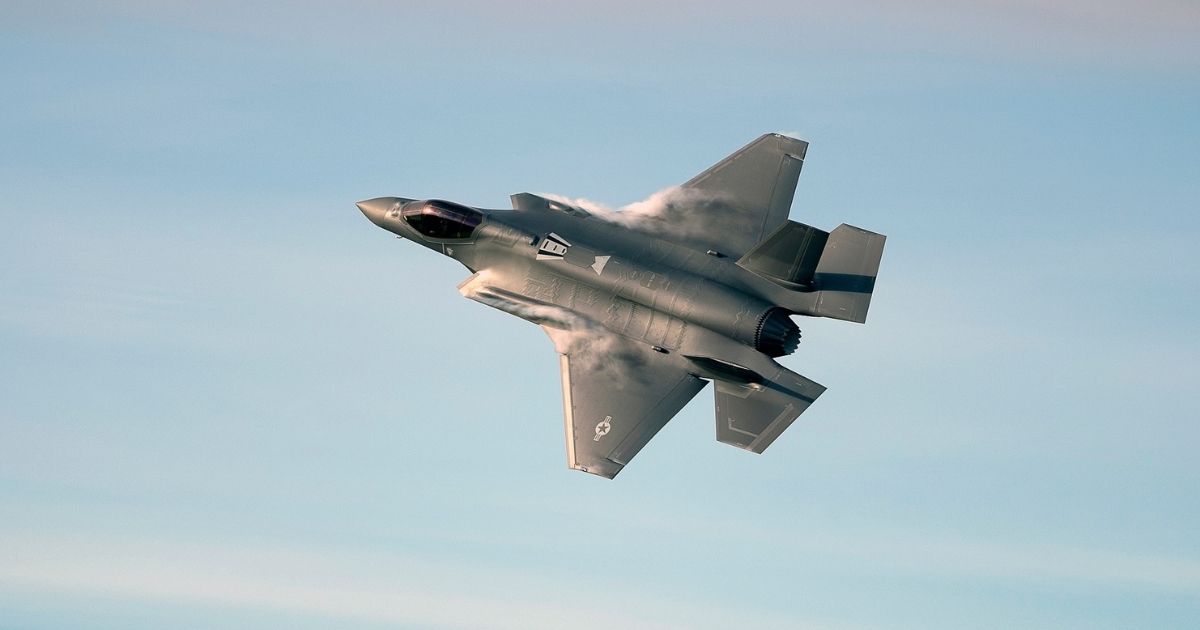As Russian forces roll through Ukraine, the United States has positioned six F-35 Lightning II stealth fighter jets to counter any Russian attack that sets foot on the soil of a NATO member.
Reports on Friday indicated the Ukrainian capital of Kyiv was under attack with Russian troops in the city.
The F-35 aircraft had been based in Germany but will now be stationed in the Baltic nations of Estonia and Lithuania as well as Romania, which is on the Black Sea, according to Fox News.
“We are facing a dynamic environment, and the deployment of F-35s to NATO’s eastern flank enhances our defensive posture and amplifies the Alliance’s interoperability,” Gen. Jeff Harrigian, U.S. Air Force commander in Europe, said in a statement.
Pentagon press secretary John F. Kirby said the U.S. is shifting forces in Europe “to assure our Allies and deter Russian aggression against NATO,” according to Fox News.
On Thursday, Secretary of Defense Lloyd Austin sent about 7,000 service members to Europe, making about 15,000 forces deployed specifically because of Russia’s invasion of Ukraine. About 90,000 U.S. service members are in Europe.
The U.S. moved other military hardware to the region in the form of 20 AH-64 Apache attack helicopters that went from Germany to the Baltic region and another dozen moved from Greece to Poland.
Troops in Poland are bracing to protect existing installations and deal with the expected flood of refugees coming out of Ukraine.
??Ukrainian civilian attempting to stop a convoy of Russian armoured vehicles in southern #Ukraine.
— Ukraine News ?? (@UkraineNews0) February 25, 2022
President Joe Biden has said U.S. troops will not be fighting in Ukraine.
“Our forces are not and will not be engaged in the conflict with Russia in Ukraine,” Biden said in remarks on Thursday from the White House. “Our forces are not going to Europe to fight in Ukraine but to defend our NATO Allies and reassure those Allies in the east.
“As I made crystal clear, the United States will defend every inch of NATO territory with the full force of American power. And the good news is: NATO is more united and more determined than ever.”
NATO has said it will respond, but the extent of that response is as yet unclear.
Justyna Gotkowska, a program coordinator at the Center for Eastern Studies in Warsaw, said some members of the alliance’s 20,000-person strong Very High Readiness Joint Task Force are likely to be sent to guard the eastern edge of NATO that abuts Ukraine, according to The Washington Post.
Gotkowska said the future is likely to include “more European allies involved in enhancing military presence on the eastern flank.”
Some said the Ukraine invasion shapes a new reality for NATO members in Europe.
“The level of risk for NATO has simply and suddenly increased enormously,” said Ian Lesser, a former American official with the German Marshall Fund, according to The New York Times. “The possibility of conflict with Russian forces in Europe or elsewhere, like the Black Sea, the Sahel, Libya or Syria, could be dangerous and will be an issue for years to come.”
“NATO had been focused on all these important and fashionable things with little to do with its core responsibility, like climate and cyber,” Lesser said. “But we forgot that there are ruthless people out there and for them, foreign policy is a blood sport.”
Former President Donald Trump had sought to change the lackadaisical way NATO members in Europe funded their own defense.
In a May 2017 speech to other NATO leaders, he said, “Over the last eight years, the United States spent more on defense than all other NATO countries combined. Two percent is the bare minimum for confronting today’s very real and very vicious threats.
“If NATO countries made their full and complete contributions, then NATO would be even stronger than it is today, especially from the threat of terrorism.”
When Trump demanded Germany stop funding Russia and start paying dues to NATO, the press spun this was “weakening the NATO alliance.”
— Cernovich (@Cernovich) February 24, 2022
The Russian invasion “changes everything for NATO,” said Ian Bond, a former British diplomat who heads foreign policy at the Center for European Reform, according to the Times.
“Russia’s aim is to extinguish Ukraine as a sovereign country in Europe,” Bond said. “Now we need to worry about everything, and we need to get serious again.’’
This article appeared originally on The Western Journal.

























 Continue with Google
Continue with Google